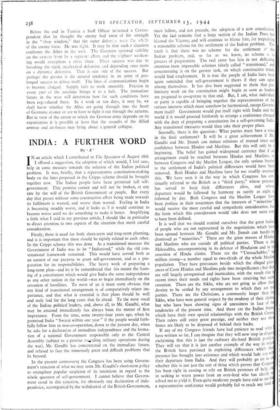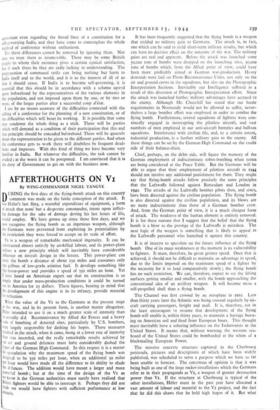INDIA : A FURTHER WORD
By '
IN an article which I contributed to The Spectator of August 18th I offered a suggestion, the adoption of which would, I feel sure,
help in some measure towards the solution of the Indian political problem. It was, briefly, that a representative constitution-making body on the lines proposed in the Cripps scheme should be brought together now. The Indian people have been promised full self- government. This promise cannot and will not be broken, at any rate by the will of the British Government or people. But every day that passes without some constructive effort being made towards its fulfilment is wasted, and worse than wasted. Feeling in India is becoming steadily worse, and it looks as if it would continue to become worse until we do something to make it better. Amplifying a little what I said in my previous article, I should like in particular to direct attention to two aspects of the situation that merit careful consideration.
Firstly, there is need for both short-term and long-term planning, and it is important that these should be rightly related to each other. In the Cripps scheme this was done. As a transitional measure the Government of India was to be " Indianised," while the old con- stitutional framework remained. This would have served both as an earnest of our purpose to grant self-government, and as a pre- paration for its responsibilities. The heavy work of preparing a long-term plan—and let it be remembered that ._his meant the fram- ing of a constitution which would give India the same independence as any other nation in the world—was to begin immediately on the cessation of hostilities. To most of us it must seem obvious that any kind of transitional arrangement is of comparatively minor im- portance, and that what is essential is that plans should be well and truly laid for the long years that lie ahead. To the most vocal of the Indian political leaders, and, above all, to Mr. Gandhi, what may be attained immediately has always been the matter of first importance. From the time, some twenty-four years ago, when he promised India " Swaraj within one year " if the people would faith- fully follow him in non-co-operation, down to the present day, when he asks for a declaration of immediate independence and the forma- tion of a national Government responsible only to the Central Assembly (subject to a proviso reAirding military operations during the war), Mr. Gandhi has concentrated on the immediate future, and refused to face the immensely great and difficult problems that lie beyond.
In the present controversy the Congress has been using Govern- ment's rejection of what we may term Mr. Gandhi's short-term policy to strengthen popular suspicion of its intentions in regard to the whole question of self-government. I cannot believe that Govern- ment erred in this rejection, for obviously any declaration of inde- pendence, accompanied by the withdrawal of the British Government,
must follow, and not precede, the adoption of a new constitution. Yet the fad remains that a large section of the Indian Press has biarned the Viceroy, and will continue to blame him, for torpedoing a reasonable scheme for the settlement of the Indian problem. The truth is that there was no scheme for the settlement e the Indian problem, and, so far as we know, no scheme is in process of preparation. The real error has lain in not deflecting attention from impossible schemes falsely called " transitional," and concentrating it on the greater task, on which constructive minds would find employment. It is true the people of India have been again reminded that self-government is theirs if they can agree among themselves. It has also been suggested to them that pre- liminary work on the constitution might begin as soon as leaders are prepared to co-operate to that end. But, I ask, what individual or party is capable of bringing together the representatives of the various interests which must somehow be harmonised, except Govern. ment itself? Government would put itself right with India and the world if it would proceed forthwith to arrange a conference charged with the duty of preparing a constitution for a self-governing India. Any transitional measures would then take their proper place.
Secondly, there is the question: What parties must have a voice in the final settlement? It will be a great achievement if Mr. Gandhi and Mr. Jinnah can induce relations of mutual trust and confidence between Hindus and Muslims. But this will only be a beginning. The belief has gained widespread currency that if an arrangement could be reached between Hindus and Muslims, or between Congress and the Muslim League, the only serious barrier to the settlement of India's political differences would have been removed. Both Hindus and Muslims have far too readily assumed this. We have seen it in the way in which Congress has con- tinually referred to the British as a "third party," whose presence has served to keep their differences alive, and whose departure would be followed by harmony as surely as night is followed by day. Both Congress and the Muslim League have been profuse in their assurances that the interests of " minorities" would receive the most careful and sympathetic consideration, bu the form which this consideraton would take does not seem ev to have been defined.
It is well that we should remind ourselves that the great bodie of people who are not represented in the negotiations which hay been opened between Mr. Gandhi and Mr. Jinnah can hardly b dismissed as " minorities." There are the great masses of Hind and Muslims who are outside all political parties. There is th Mahasabha, uncompromising in its defence of Hinduism and in it assertion of Hindu claims. There are the " Untouchables," million strong—a number equal to two-thirds of the whole Musl population. They have grievances beside which the alleged griey antes of Caste Hindus and Muslims pale into insignificance ; but the are still largely unorganised and inarticulate, with the result that : recent times their needs and rights have been receiving but scan attention. There are the Sikhs, who are not going to allow the destiny to be settled by any arrangement to which they are no parties. There are the Christians, a community larger than th Sikhs, who have won general respect by the modesty of their claim but who have been showing signs of uneasiness in face of th tendencies of the present time. And there are the Indian State which have their own special relationships with the British Crow Their rulers still enjoy great prestige, and neither they nor the' States are likely to be disposed of behind their backs.
If any of my Congress friends have had patience to read what have written so far, I can imagine that they will now'stop in disgus exclaiming that this is just the ordinary die-hard British positio They will say that it is just another example of the way in whit the British have persisted in exploiting differences which the presence has brought into existence and which would fade out wit their departure from inclia. And they will probably go on to a whether this is not just the sort of thing which proves that Congre has been right in ceasing to rely on British promises of help, 2 in seeking to wrest power from an over-lord who has clearly solved not to yield it. Even quite moderate people have said to me th
a representative conference would probably fail to reach any kind
agreement even regarding the broad lines of a constitution for a self-governing India, and they have come to contemplate the whole method of conference without enthusiasm.
Yet these differences cannot be removed by ignoring them. Nor dare we treat them as irremovable. There may be some British people to whom their existence gives a certain cynical satisfaction, but if such there be they are sadly lacking in understanding. The perpetuation of communal strife can bring nothing but harm to India itself and to the world, and it is to the interest of all of us that it should cease. If India is to become self-governing, it is essential that this should be in accordance with a scheme agreed upon beforehand by the representatives of the various elements in the population, and not imposed upon them by one, or by two or more, of the larger parties after a successful coup d'etat.
I am by no means unaware of the difficulties connected with the calling of a conference for the planning of a new constitution, or of the difficulties which will beset its working. It is possible that some may condemn the whole thing as a trick. There will be parties which will demand as a condition of their participation that this and that principle should be conceded beforehand. There will be quarrels about the representation to be given to the different parties. And when the conference gets to work there will doubtless be frequent dead- locks and impasses. With this kind of thing we have become very familiar in India. But whatever the difficulties, the task cannot be evaded ; at the worst it can be postponed. I am convinced that it is the duty of Government to get on with the business now.























 Previous page
Previous page